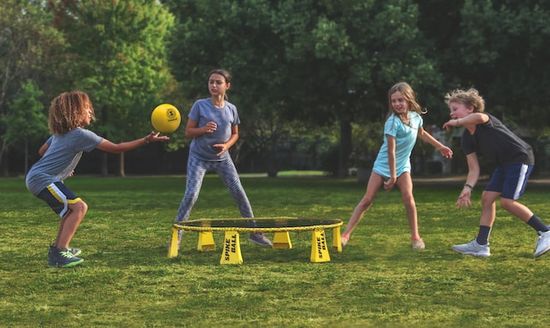School’s out, the sun’s shining, and your kids are thrilled to have the summer ahead of them. Then three days in, you hear, “I’m bored…”
What’s something kids can do that’s fun and active, but also wholesome and constructive? How can they make some great memories over the summer?
These questions lead many parents to look into Christian summer camps.
Seventh-day Adventists, a Protestant Christian denomination, enthusiastically believe in the priceless benefits of this kind of ministry. They offer several Christian summer camp programs across the US, where kids can learn about God while having fun, making friends, learning new skills, and staying active. An unforgettable summer awaits!
Here’s everything you need to know about the many Christian camps the Adventist Church operates:
- Why Adventist summer camps started
- What camp activities do they offer?
- How are Adventist summer camps different from others?
- Who can come to camp?
- When are the camps held?
- What are the benefits?
- Where can I find one?
Let’s jump right in!
Why Adventist summer camps started1
Christian summer camps provide kids with an unforgettable experience of wholesome fun and spiritual growth while experiencing the great outdoors. Grover Fattic—an Adventist youth director in Michigan—had this in mind when he decided to start the first one.
The year was 1927. That year, Fattic planned a 10-day summer camp for boys in Townline Lake, Michigan. It was a smashing success with 18 boys who enjoyed time outdoors and came to know God in a deeper way.
And the girls didn’t want to miss out! So the following year, a camp began for them. Before long, programs sprang up in Wisconsin, California, and New England.
Today, the United States has 67 Adventist camps with a collective of 30 to 35,000 campers attending every year—not to mention the others worldwide!
Let’s learn more about what happens at these camps.
What activities do Christian summer camps offer?
Christian camps are full of highly active and enjoyable outdoor adventures. And as far as the actual activities list, it’s similar to most outdoor summer camp programs across the country.
Here are some common activities you’ll find at an Adventist summer camp:
- Hiking
- Horseback riding
- Bike riding
- Archery
- Geocaching
- Go-karts
- Rock climbing
- Zip-lining and climbing ropes courses
- Wilderness survival
- Sports, such as soccer, volleyball, or basketball
- Water activities, such as swimming, canoeing, boating, rafting, or water skiing
- Arts and crafts
These types of activities never get old or go out of style! Not only are they a step up from most day-to-day things you can do at home, but they allow kids to discover new opportunities and skill-sets.
How are Adventist summer camps different from other ones?

Photo by Ekaterina Novitskaya on Unsplash
So if most of the daily camp activities are similar to other camps, what makes Adventist summer camps different from other camps? Or different from other Christian camps and programs?
At Adventist camps, while there is certainly an overall effort to provide a Christ-centered environment, these summer camps are not the same as “Bible camps,” or programs that are meant to involve seminars and Bible studies.
Our summer camps are operated as a service we can provide to kids and parents. The idea isn’t to convert each camper, but to help them experience the joys of nature and the love of Jesus. All while learning about teamwork and building friendships.
They are also different from VBS (vacation Bible schools), which take place at a church for a couple of hours every night over the course of a week. These involve singing, crafts, and activities for children under the age of 12.
At an Adventist summer camp, the character-building and memory-making take place in action.
Parents can feel at ease sending their children to camp because our guidelines uphold biblical principles, such as the invaluable worth of every human being and the unconditional love of Jesus. And this is all available within a safe environment with healthy meals, regular exercise, and time in the sunshine and fresh air.
(The meals provided will be vegetarian, so as to provide a healthy and inclusive diet for those attending.)
Above all, we want every camper to feel accepted, safe, and loved. Camp staff are encouraged to introduce young people to Jesus not through theological instruction or lists of do’s and don’ts, but through:
- Daily morning devotions—prayer, devotional thoughts, Scripture, and sometimes singing
- Approachability of staff for kids who need encouragement
- Friday evening worship
- Team-building activities
- Nature-focused church programs on Sabbaths
There’s so much we can learn about God just by spending time in nature, learning about everything He created.
Who can come to a Christian summer camp?
Anyone between the ages of 8 and 17 can attend a Christian summer camp.
Most overnight camps are co-ed, with boys and girls housed in separate cabins in separate areas. Each camp program is typically divided by age categories:
- Ages 8–9
- Ages 10–12
- Ages 11–13 (middle school)
- Ages 14–17 (high school)
But many facilities also offer day camp and family camp programs.
Furthermore, some locations have programs for the blind and the deaf. Learn more about the Adventist ministry, Christian Record Services for the Blind, for a directory of their camp programs.
When are Christian summer camps held?
Most Adventist summer camps are open anywhere from 8-10 weeks during the summer, usually from mid-June through August in the United States.
Each camp for a specific age category typically lasts one week, though some camps offer the option of attending for more than one week.
Most Adventist camp facilities also host other events or programs during the rest of the year, when summer camp is not in session.
What are the benefits of Christian camps?

Photo from Unsplash
Christian summer camps offer countless benefits for their attendees. Here are some notable ones:
Wholesome camp experiences—good clean fun!
Campers take a break from digital devices to spend time outdoors. They engage in nature and physical activity—something that can be harder to do at home where there’s limited space, or where it can be easy to get distracted by movies, video games, and the internet.
Spiritual growth
Being out in nature and away from distractions allows campers opportunities for deeper thought and reflection. Kids can connect with God on a personal level while enjoying His creation hands-on.
Here’s some insight from the founder of the Association of Adventist Camp Professionals, Norm Middag:
“Camping helps develop spiritual meanings and values that help [campers] strengthen their character. Lifetime friendships are made through these experiences.”
Another witness to this spiritual growth is Angie Stroud, whose husband Randy is a staff member at Big Lake Youth Camp in Oregon.
To her, one of the biggest benefits of camp is the “exposure to God” that kids get and the way they learn to “have a real relationship with Him through Jesus.”
In 2008, 22 camps participated in a survey about their impact. In over 4,000 responses from staff, alumni, and campers, many said they valued their religion more because of the spiritual activities. The survey also found a connection between time spent out in nature and a young person’s devotion to serving God.2
Character growth and self-esteem
Aside from spirituality, campers grow in other ways. Camp has a powerful impact on the psychological development of children. As they participate in activities pushing them to their limits, they learn bravery, courage, trust, teamwork, and problem-solving skills.
Campers also can build their self-confidence as they discover new activities and skills they haven’t yet known about. For example, maybe one child is discouraged that they aren’t as good at sports as their friends, so they start to think they’re not talented or coordinated. But then maybe they discover swimming, the ropes course, weaving, clay sculpting, or archery—and realize they can indeed find an activity they enjoy or can do well.
Also, for some kids it’s also their first time away from home. A caring, supportive environment at an Adventist summer camp can help them feel safe and secure, while also allowing them to develop healthy independence and responsibility for themselves and their belongings.
Positive friendships

Photo by Robert Collins on Unsplash
In a world where so much happens virtually, the camp experience allows kids to connect in person with others their age. They’re more likely to meet other Christian youth who might have a positive impact on them. It’s not uncommon for lifelong friendships to begin at camp!
Angie Stroud points out that kids usually see their counselors as mentors and look up to them. “I still am good friends with my favorite counselor when I was a camper!” she says.
The new friends made at camp can have an impression that last for life, and even for eternity.
How much does summer camp cost?
Christian summer camps can cost anywhere from $250 to $650. A lot of this depends on the location, the facility, and the program or type of camp selected.
This fee covers a whole week of food, lodging, and activities—plus the many benefits listed above that can’t be measured!
(Compared to the cost of many other types of vacations, this can be considered quite a deal!)
Specialty camps, such as those focused on horseback riding, rock climbing, or white water rafting, may have different pricing.
Find a Christian summer camp near you!
If you’d like to learn more about Adventist summer camps, there may be one near you!
To see a comprehensive list of 60+ camp facilities in 36 states, as well as other locations in Canada, use the directory on the Association of Adventist Camp Professionals website. Australia also has a directory.
For North America, here are just a few of the popular ones:
- Sunset Lake Camp (Washington)
- Mountain View Summer Camp (British Columbia)
- Pine Springs Ranch (California)
- Camp Wawona (California)
- Glacier View Ranch (Colorado)
- Broken Arrow Ranch (Kansas)
- Camp Cherokee (New York)
- Camp Kulaqua (Florida)
All these Seventh-day Adventist summer camps are on a mission to serve families looking for good, constructive, character-building activities that provide unforgettable experiences.
It’s highly likely your kids will come home exhausted from all they’ve done. But it’s also highly likely they’ll come home with cherished memories, new skills, and a revitalized spirit.
Learn more about other ministries for young people that run throughout the year.
- Maran, Kimberly, “Adventist Summer camps Are ‘Youth Evangelism at Its Best,’” Bethany SDA Church Almere, Oct. 18, 2016; William, Wood, “Summer Camp: Where God Spends His Summers,” Adventist Review, May 23, 2012. [↵]
- Wood, “Summer Camp: Where God Spends His Summers.” [↵]
Related Articles
More Answers
What Is Vespers?
Friday rolls around, and you’re spending time with your Adventist friends or relatives when they mention they’re going to vespers tonight.
Adventist Pastors
What is the role of a pastor in the Adventist Church? The position itself, at least as far as a local congregation is concerned, is not much different from that of pastors in other protestant denominations.
The Leadership Structure of the Seventh-day Adventist Church
The Seventh-day Adventist Church has a representative form of structure that connects its 90,000-plus congregations across the globe and gives its members a part in decision-making. Though the Church was incorporated in 1863, this system came about during the church’s reorganization from 1901 to 1903. It includes four levels of organization.
What to Expect When You Go to an Adventist Church
If you’re attending an Adventist church for the first time, you may wonder what it’s really like. While each Adventist church is unique in its collective personality and local culture, Adventist church services are generally similar to most other Protestant church services.
Adventist Education
Seventh-day Adventists have historically upheld the importance of a well-rounded, high-quality education. Instead of a one-size-fits-all approach to teaching and learning, the Adventist Education system operates on the principle of educating the “whole” person.
Evangelism
Evangelism is simply sharing the truths of the Bible with someone else. And Adventists are all into it.
Everything You Need to Know About an Adventist Church Potluck
Every so often, usually on a schedule ranging from once a week to once a month to once a quarter, an Adventist church will have “fellowship dinners,” often casually referred to as potlucks.
The Seventh-day Adventist Hymnal
The Seventh-day Adventist Hymnal is a songbook used worldwide by many Adventist congregations during their worship services. Since its publication in 1985, it has helped foster praise to God while reminding church members of our mission and drawing them closer to Jesus.
What Are Seventh-Day Adventist Sermons Like?
In nearly every Seventh-day Adventist Church, the sermon is the focal point of the main service—similar to many Protestant Christian denominations. It is a time of biblical instruction by the pastor, who shares what they’ve been studying in the Bible and preparing over the previous week.
Who Are Adventists
The Seventh-day Adventist Church—“Adventists” for short—is a Christian denomination of ordinary people who seek to follow Jesus and live out His mission in this world. Established in 1863, we hold to the Protestant principle of sola scriptura, which means the Bible guides everything we do.
Why is the Great Controversy in my mailbox?
Every year, households across North America receive free copies of a 150-year-old book, The Great Controversy. Millions more are shared around the world.
How do Adventists choose what to eat?
Food blogs overwhelm the internet; food fads are all the rage; and copycat and healthy versions of food are the subject of many a get-together.
Didn’t find your answer? Ask us!
We understand your concern of having questions but not knowing who to ask—we’ve felt it ourselves. When you’re ready to learn more about Adventists, send us a question! We know a thing or two about Adventists.
















